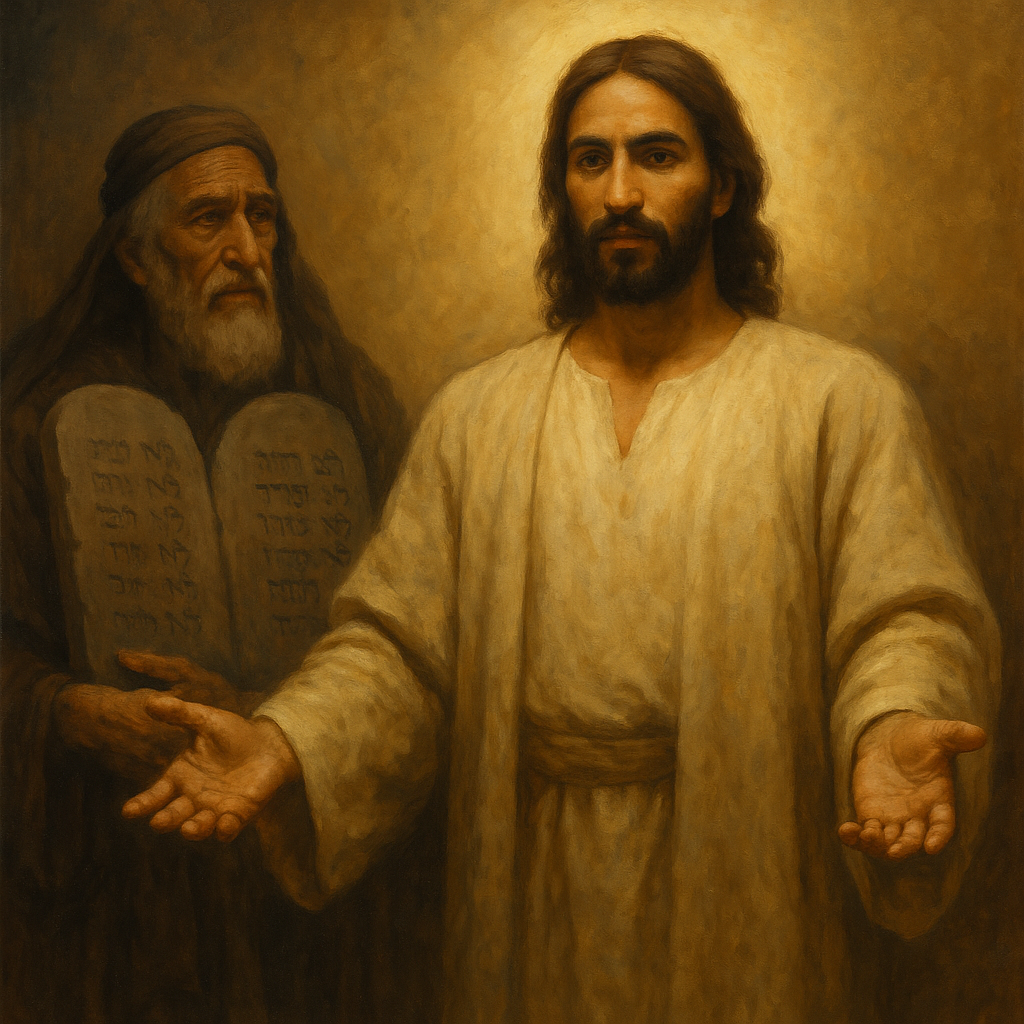Post 2 – Jesus and the Law: Fulfillment, Not Cancellation

This post is part of the series: "Why We Need the Old Testament—Now More Than Ever"
See the full series here
Jesus and the Law: Fulfillment, Not Cancellation
What Did Jesus Mean When He Said He Came to Fulfill the Law?
For many modern readers, the Old Testament law feels like the biggest obstacle in their relationship with the Bible.
Some ignore it entirely. Others cherry-pick commands to enforce on others. Some even try to live by it again, hoping to reclaim a more “authentic” faith.
But Jesus offers a third way.
In one of His most misunderstood statements, He declares in Matthew 5:17:
“Do not think that I have come to abolish the Law or the Prophets; I have not come to abolish them but to fulfill them.”
What does that mean? What does it mean to “fulfill” the Law? Does any of it still apply to Christians today?
Let’s walk through this together.
Jesus Didn’t Cancel the Law—He Completed Its Purpose
Jesus didn’t discard the Old Testament law like a bad first draft. Instead, He stepped into the story it was always pointing toward.
The Law was never an end in itself. It was a covenant with Israel that revealed:
- God’s holiness
- His design for justice and community
- The impossibility of being righteous apart from grace
Jesus fulfilled the Law in three main ways:
- He obeyed it perfectly (Matt. 5:18, Rom. 10:4)
- He exposed its deeper meaning (Matt. 5:21–48)
- He completed its purpose by ushering in a new covenant (Luke 22:20, Heb. 8)
So we don’t follow the Law as law—we follow the One to whom it pointed.
“You’ve Heard It Said… But I Say to You”
In Matthew 5:21–48, Jesus makes something radical yet deeply faithful clear: He doesn’t relax the Law—He deepens it.
He doesn’t say, “Don’t murder? Good enough.”
He says, “Don’t even harbor anger.”
He doesn’t say, “Avoid adultery.”
He says, “Don’t even objectify someone with your eyes.”
Jesus takes the moral heart of the law and pushes it inward—to the level of the heart, desire, and intention.
This isn’t moralism. It’s holiness redefined as love (Matt. 22:37–40)—empowered by the Spirit, not by striving.
What Parts of the Law Still Apply to Christians?
To understand how Christians relate to the Old Testament Law, it’s helpful to distinguish between three traditional categories: ceremonial, civil, and moral. These aren’t rigid divisions found in the text itself, but they are useful in showing how Jesus fulfills the Law in different ways.
1. Ceremonial Law
(e.g., sacrifices, temple rituals, dietary laws)
What it was:
These laws governed Israel’s worship, priesthood, sacrifices, festivals, and ritual purity. Their purpose was to make a way for sinful people to dwell in the presence of a holy God.
Examples:
- Leviticus 1–7: Instructions for burnt offerings, sin offerings, and guilt offerings
- Leviticus 11: Clean and unclean food laws
- Leviticus 16: Day of Atonement rituals
- Exodus 30: Instructions for the altar of incense and priestly garments
How Jesus fulfills it:
Jesus is the true Lamb of God (John 1:29), the great High Priest (Heb. 4:14–16), and the final sacrifice (Heb. 10:10–14). He is also the true Temple (John 2:19–21)—the place where God’s presence dwells fully.
“He entered once for all into the holy places… by means of His own blood, thus securing an eternal redemption.” —Hebrews 9:12
Why it no longer applies:
To return to temple rituals or sacrifices would be to deny the sufficiency of Jesus’ once-for-all atonement (Heb. 10:18). Christians now worship “in spirit and truth” (John 4:23–24), not by maintaining ritual purity or sacrificial systems.
A Warning About Modern Misuse
Alarmingly, some Christians today—especially within certain Evangelical or dispensationalist circles—are supporting efforts to reinstate temple worship in Jerusalem. This includes:
- Supporting the construction of a Third Temple
- Funding the breeding of a red heifer for purification rites
- Advocating for a return to Levitical priesthood and sacrifice
These movements misunderstand the gospel and risk undermining the finished work of Christ. Hebrews warns us not to return to what Jesus has fulfilled. To do so is not only unnecessary—it is spiritually dangerous.
2. Civil Law
(e.g., case laws and governance for ancient Israel)
What it was:
These were laws that governed the civic and judicial life of Israel as a theocratic nation.
Examples:
- Exodus 22: Property laws and restitution
- Deuteronomy 19: Cities of refuge and false witnesses
- Leviticus 25: Jubilee and land redemption
- Deuteronomy 24: Protection for workers, foreigners, and the poor
How Jesus fulfills it:
Jesus launches a global Kingdom that transcends ethnic and national boundaries. The Church is now a Spirit-formed people, not a nation-state. Civil laws no longer govern us—but the values of justice, equity, and mercy still apply.
Why it matters today:
We don’t enforce these case laws, but we apply their wisdom. They reveal God’s heart for justice and compassion, especially toward the vulnerable.
3. Moral Law
(e.g., love God, love neighbor, Ten Commandments)
What it was:
The moral law reveals God’s holy character and His design for human flourishing in community.
Examples:
- Exodus 20: The Ten Commandments
- Leviticus 19: Love your neighbor as yourself
- Deuteronomy 6: Love the Lord your God
- Micah 6:8: Do justice, love mercy, walk humbly
How Jesus fulfills it:
Jesus embodies the moral law perfectly and deepens it. He teaches that true righteousness is internal—rooted in love, not just external obedience.
Why it still applies:
Christians live by the moral law—not to earn favor, but to express love.
We follow the Spirit, and the Spirit leads us into the holy character of Christ (Gal. 5:22–23).
Live Sent Practice
Choose one Old Testament command and explore how Jesus reshapes or fulfills it.
Try one of these:
- Sabbath: What does true rest look like in Christ? (Matt. 11:28–30)
- Justice: How does Jesus live out justice and mercy toward the marginalized? (Luke 4:18–19)
- Purity: How does Jesus redefine holiness from ritual to heart posture? (Mark 7:1–23)
Let the Law lead you to Jesus. Then let Jesus lead you deeper into the heart of God.
Series Index
- Why We Need the Old Testament—Now More Than Ever
- Jesus and the Law: Fulfillment, Not Cancellation
- (Upcoming) Types and Shadows: Finding Christ in the OT
- (Upcoming) God's Mission Didn’t Start in Matthew
- (Upcoming) Justice, Mercy, and the Prophets
- (Upcoming) How to Read the Old Testament Like Jesus
- (Upcoming) Living the Whole Story
